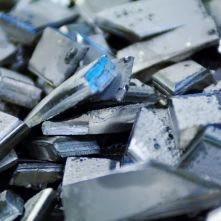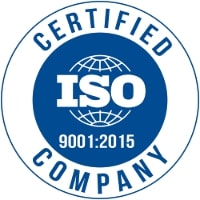BIS Certification for Refined Nickel IS 2782:2023

In industrial sectors like
electronics, aerospace, chemical processing, and manufacturing, Refined Nickel
plays a critical role due to its excellent corrosion resistance, strength, and
high melting point. With its growing applications across crucial industries,
ensuring the quality and consistency of refined nickel is more important than
ever. That's why obtaining the BIS certification for Refined Nickel has now
become mandatory in India.
Let’s explore the importance of BIS certification, the key requirements under the Indian Standard for Refined Nickel (IS 2782:2023), and the implications of the latest government mandate for manufacturers. We'll also understand the significance of obtaining the ISI certification for Refined Nickel and proudly displaying the ISI mark.
Recent Regulatory Update:
Refined Nickel (Quality Control) Order, 2025
In a significant move towards ensuring
product quality, the MINISTRY OF MINES issued the Refined Nickel (Quality
Control) Order, 2025. This order mandates that all manufacturers of refined
nickel must obtain BIS certification for Refined Nickel. Furthermore, products
must bear the Standard Mark (ISI mark) under a license from the Bureau of
Indian Standards, in accordance with Scheme-1 of Schedule-II of the Bureau of
Indian Standards (Conformity Assessment) Regulations, 2018.
This government order ensures that only high-quality, certified refined nickel is produced, imported, or sold in India, safeguarding industrial applications and maintaining product excellence across sectors.
Also Read
BIS QCO for Refined NickelWhat is BIS Certification
for Refined Nickel?
The Bureau of Indian Standards (BIS), India's national standards body,
grants certification to products that conform to specific Indian standards. The
BIS certification for Refined Nickel
ensures that the material complies with stringent quality, safety, and
performance requirements as per IS 2782.
Once certified, manufacturers are allowed to mark their products with the ISI mark, a symbol of quality, reliability, and trustworthiness in the Indian market.
Indian Standard for
Refined Nickel IS 2782:2023
IS 2782:2023 specifies the quality
requirements for Refined Nickel. The
standard covers chemical composition and purity levels, mechanical and physical
properties, impurity limits for elements like iron, sulfur, copper, and carbon,
testing methods to verify compliance, and marking and labeling norms for
certified products.
By adhering to the Indian Standard for Refined Nickel, manufacturers ensure that their products meet the necessary industrial performance standards and are fit for critical applications.
Importance of ISI
Certification for Refined Nickel
Securing the ISI certification for
Refined Nickel offers several important benefits:
How to Obtain BIS
Certification for Refined Nickel
Obtaining BIS certification for
Refined Nickel involves the following steps:
- Application
Submission: Submit the completed application
form with necessary documentation to BIS.
- Document Review: BIS evaluates the submitted documents to verify accuracy and
completeness.
- Factory Inspection: BIS officials conduct on-site inspections to assess
manufacturing processes and quality control systems.
- Sample Testing: Product samples are collected and tested at BIS-approved
laboratories to verify compliance with Indian standards.
- Certification Grant: Upon successful inspection and testing, the BIS issues the certification, allowing the use of the ISI Mark.
Documents Required for BIS Certification
To apply for ISI
Certification for Refined Nickel, manufacturers must provide the following
documents:
● Completed application form
● Detailed manufacturing process
information
● Quality control plans and test
reports
● Factory layout and equipment
details
● Product specifications and
technical details
● Business registration proof
● Declaration of conformity to
Indian standards
Additional documentation may be required based on product specifications and environmental regulations.
Documents Required for BIS Certification
To apply for BIS certification, manufacturers need to submit the following documents:
● Application form
● Manufacturing process details
● Quality control plan
● Test reports from BIS-approved laboratories
● Factory layout and equipment details
● Proof of business registration
● Product specifications and technical details
● Declaration of conformity to Indian standards
Additionally, manufacturers may be required to provide proof of compliance with environmental and safety regulations, depending on the specific type of product being certified.
BIS ISI Mark Certification Costing And Timeline
To Know The Process in Detail, Please Visit:
Under BIS Registration Products ISI and CRS
Conclusion
With the Refined Nickel (Quality
Control) Order, 2025 now in force, obtaining the BIS certification for Refined
Nickel is no longer optional — it's a mandatory requirement. Manufacturers who
comply with the Indian Standard for Refined Nickel (IS 2782:2023) and achieve
the ISI certification for Refined Nickel can proudly display the ISI mark,
affirming their commitment to quality, safety, and excellence.
As industries become more
quality-conscious, aligning with national standards through BIS certification
ensures greater trust, broader market access, and long-term success for
manufacturers in India and beyond.
Free Call Back
Latest News & Update
📅 BIS Critical Component List (CCL) Updates for Solar PV Modules
🕒 BIS Fee Concessions for MSMEs and Startups | EVTL India
📅 Guidelines for Implementation of Essential Requirements for Security of CCTV
🕒 Omnibus Technical Regulation (OTR) Amendment Order, 2025
🕒 Extension of Timeline for Filing Annual Returns by Battery Producers
📅 Extension of Timeline for Filing Quarterly and Annual Returns for E-Waste
🕒 Extension of Concurrent Running Period for IS 302-1: 2008 and IS 302 (Part 1): 2024
🕒 BIS Guidelines for Grant of Licence (GoL) | EVTL India














